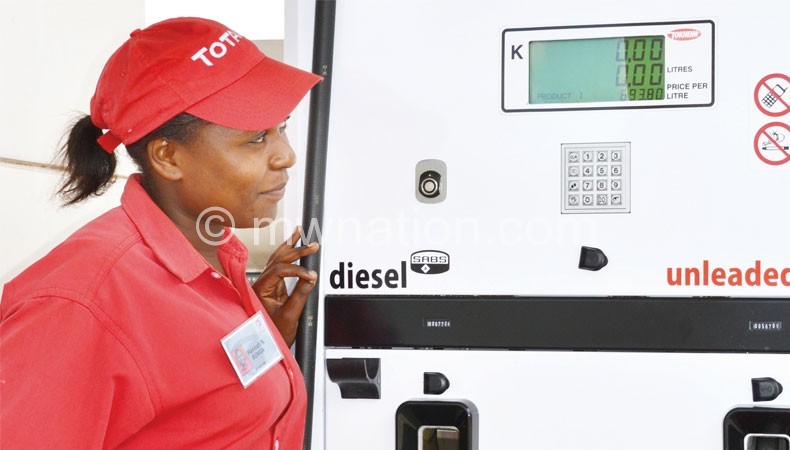Fuel prices down again, consumers disappointed
After being cut by about 10 percent in early January, prices of fuel—petrol, diesel and paraffin— have effective yesterday, been reduced by an average 10 percent triggered by falling global prices and appreciation of the kwacha.
Malawi Energy Regulatory Authority (Mera) acting chief executive officer Elias Hausi said in a statement that effective February 5, petrol would be selling at a maximum pump price of K696.30 from K760.40 per litre and diesel is now selling at K705.50 from K785.40 per litre.

Paraffin, mostly used by rural and semi-rural inhabitants, is selling at K609.30 from K678.80 per litre.
The energy regulatory authority has explained that the reduction follows an assessment on the impact of the movement in the international oil prices, kwacha to dollar exchange rate and other macro-economic indicators.
But regardless of the decline, consumers are bitter that the falling prices have not been translating into a decrease in prices of goods and services on the market.
Consumers Association of Malawi (Cama) executive director John Kapito in an interview yesterday said it is disappointing that when fuel prices rise or the kwacha depreciates traders raise commodity prices instantly.
“Fuel prices have been falling while the kwacha has been appreciating, but some traders have been raising their prices instead of reducing them.
“Due to the high prices, the traders are not even selling much. These businesspeople are, however, still adamant and do not want to reduce their prices,” he said.
Malawi subscribes to free market principles, but Kapito argued that the market is not mature enough for prices to be left to be determined by market forces of demand and supply.
He noted that because there are a few businesspeople that control the market, the economy has to be managed, with authorities ensuring that prices are fair and reflect changes in input costs.
Transport cost, which has a direct relationship to petroleum fuel, comprises about 6.6 percent of the consumer price index (CPI)—an aggregate basket of commodities used to compute inflation.
But prior to the recent price reduction, available data indicated that Malawi has one of the highest fuel prices in the world while authorities blamed it on high transportation costs.
Minister of Natural Resources, Energy and Mining Atupele Muluzi agreed that the country has one of the highest fuel prices, but blamed it on logistical challenges that Malawi experiences as a landlocked country.
He explained that to bring down the cost of petroleum fuel, government is negotiating with fuel importers to use the railway line.
Muluzi also pointed out that the fuel reserves being constructed in the country’s three regions will stock up to 60 million litres, which will act as a hedge against fluctuating global fuel prices.






I share your concerns Kapito. The problem is that will have a sleepy government. Ministers and government officials should have been speaking to the business community. Even President Mutharika including his vice should have been urging the business community to reduce the prices including the fares. But everyone is quiet.
As a housewife, I am really sad about this.